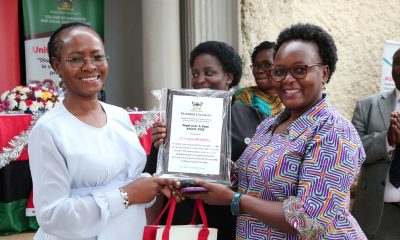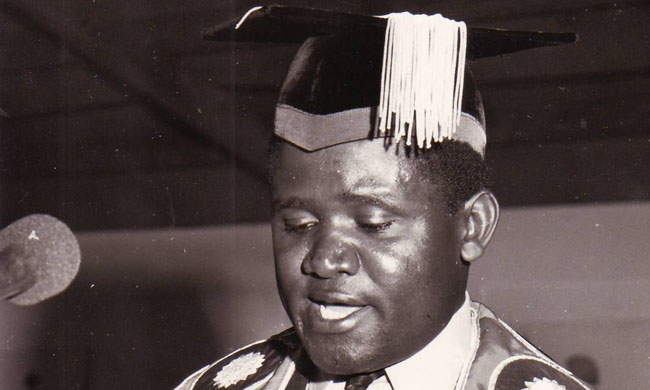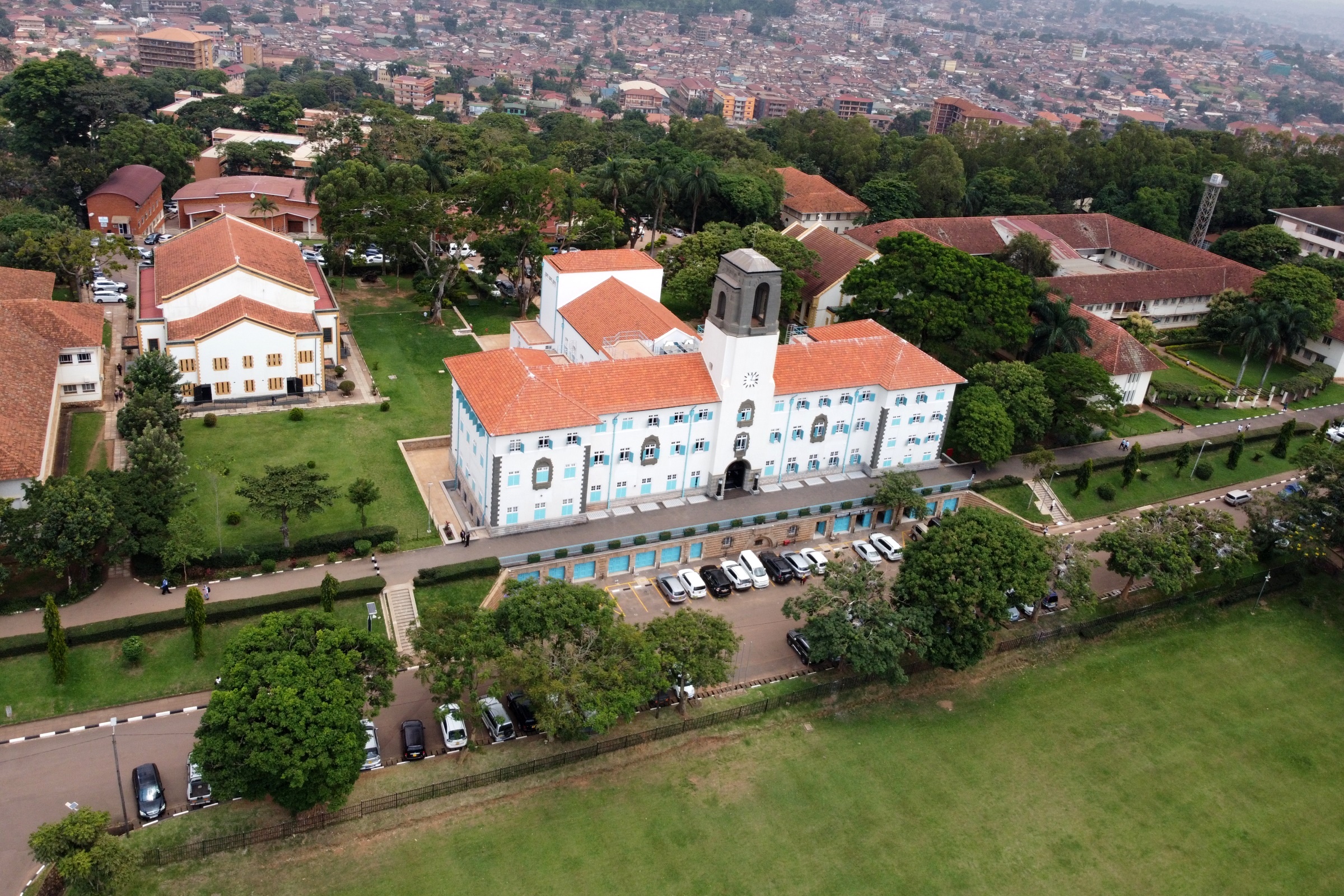The two were part of the formidable team that oversaw the successful implementation of the affirmative action for more girls to attain University education in Uganda
—–
The Department of the Academic Registrar (AR) lost two former Academic Registrars, credited with laying a firm foundation for the Department. The late Bernard Onyango served in the Department from 1963 to 1992, first as a Deputy Registrar and later as Academic Registrar. He was laid to rest on Thursday 17th October 2013. The late Gershom Eyoku served in different capacities from August 1978 to Jan 1992, then as an Acting Academic Registrar until his retirement in June 1996. He was laid to rest on Friday 4th October 2013 in Asamuk, Amuria District.
Below is a tribute to them as told by a former workmate, Mr. James G. Okello, Deputy Registrar, Head of Senate Division. Mr. Okello had the privilege of working in the Academic Registrar’s Department under both men, who were a strong force; driving the Academic Registrar’s Department forward even throughout the turbulent political times of the 1970s.
 One of the most outstanding contributions of the late Bernard Onyango was the initiation of the 1.5 scheme to enable more female students’ access University education. Mr. James Okello recalls how a speech was drafted for the President to read out at the Graduation ceremony in…. Part of this speech emphasized that Makerere University should initiate a mechanism to ensure that more girls are admitted without compromising the merit system. Bernard Onyango was the brain behind this speech.
One of the most outstanding contributions of the late Bernard Onyango was the initiation of the 1.5 scheme to enable more female students’ access University education. Mr. James Okello recalls how a speech was drafted for the President to read out at the Graduation ceremony in…. Part of this speech emphasized that Makerere University should initiate a mechanism to ensure that more girls are admitted without compromising the merit system. Bernard Onyango was the brain behind this speech.
“He came to me and asked me to initiate a draft which he improved. Everything happened so fast because the late Onyango knew how to lobby. The speech was sent to the President a week before graduation. He approved the idea and read it out during the Friday graduation; which was the only day reserved for this ceremony then. On Saturday morning, Onyango came to my house. He was happy that the President had read the speech with the female scheme idea in it. He suggested that we head to office and start drafting a proposal for Senate to consider in the coming week,” recalls a jovial Mr. Okello who was then serving as Personal Assistant to Onyango. After drafting the document for Senate, the two went for a drink to celebrate this partial achievement. “There were no posh bars by then. We just went to a pub in the vicinity of the University and had a beer each,” adds the nostalgic Okello.
By combining his excellent lobbying skills and powers as Secretary to Senate, Onyango managed to get Senate to accept the proposal for the 1.5 additional points to female students applying for the Government scholarship. Then University Senate then tasked the Academic Registrar’s Department to detail how the scheme would work. The late Prof. William Ssenteza Kajubi who was then Vice Chancellor and Chair of Senate complemented the efforts of this great team by ensuring that this scheme was successfully implemented after all parties had been brought on board regarding its dynamics.
In the Academic Department was another brilliant and highly committed person, the late Mr. Gershom Eyoku, who was tasked with coming up with the mathematical formula on how exactly the scheme would work. “Eyoku was initially hesitant because he feared that the scheme would compromise the merit system, but after Onyango explained the intention and merits, he (Eyoku) got started on the math. He came up with the 1.5 points which were discussed at other fora and thereafter adopted,” explains Okello.
 The Scheme took effect in 1990 and continues to significantly contribute to the increased enrolment of female students. The graduation records show that only about 25% of the graduands were female compared to 75% of their male counterparts prior to the scheme’s introduction. The pattern has changed drastically courtesy of this policy and the private admission scheme; for example, during the last graduation held in January 2013, the figures were 46.7% of female students compared to 53.3% of male students. The successful implementation at Makerere attracted other countries to come to Uganda to benchmark with Makerere. These countries; Ghana, Kenya, Rwanda, Tanzania, and Zimbabwe, have lowered admission cut-off points for female candidates.
The Scheme took effect in 1990 and continues to significantly contribute to the increased enrolment of female students. The graduation records show that only about 25% of the graduands were female compared to 75% of their male counterparts prior to the scheme’s introduction. The pattern has changed drastically courtesy of this policy and the private admission scheme; for example, during the last graduation held in January 2013, the figures were 46.7% of female students compared to 53.3% of male students. The successful implementation at Makerere attracted other countries to come to Uganda to benchmark with Makerere. These countries; Ghana, Kenya, Rwanda, Tanzania, and Zimbabwe, have lowered admission cut-off points for female candidates.
As Academic Registrar, Bernard Onyango did not tolerate any examination malpractice. Culprits of the same (both students and staff) were dismissed if found guilty and also publicized in the press. Okello recalls that before exams started, Onyango would issue a strongly worded letter to all faculties cautioning against examination malpractice and stating that names of culprits would be publicized in the press.
“Onyango had a policy that University affairs should not be managed in the press and any negative stories about Makerere University in the press were treated as a tip for internal investigations to start. But when it came to examination malpractice, Mr. Onyango besides getting them dismissed from the university would publicize the names of the culprits in the national newspapers. This served as a big deterrent for those who would have otherwise been involved. We sometimes referred to him as IGG because he did not tolerate any form of malpractice,” asserts Okello.
 Onyango in an effort to ensure that persons in leadership in the Academic Units are accountable to staff Members in their units, initiated a policy of election of Deans and Heads of Department. This practice is now enshrined in the universities and other tertiary institutions act and resulted in many young academician taking up leadership positions in the university. Initially such positions fell vacant after the departure by retirement or death of the Office bearers.
Onyango in an effort to ensure that persons in leadership in the Academic Units are accountable to staff Members in their units, initiated a policy of election of Deans and Heads of Department. This practice is now enshrined in the universities and other tertiary institutions act and resulted in many young academician taking up leadership positions in the university. Initially such positions fell vacant after the departure by retirement or death of the Office bearers.
Onyango also worked hard to attract scholarships and would go to embassies and make a case for scholarships at Makerere. He was a leader who mentored some of the Vice Chancellors too and would encourage colleagues with leadership qualities to take up positions. He particularly encouraged all employees in the AR’s Department to read each and every document of the University, irrespective of its content or discipline. He emphasized that the team in AR’s Department had to be informed in order to ably contribute and give guidance to whatever was discussed in meetings.
“The pass mark was initially at 40%. He would encourage us to read what the situation was like in other universities and compare with Makerere. Eventually he initiated a policy that the pass mark be raised to 50% as was the practice in other first-class universities. He trained the late Eyoku to take up after him,” adds Okello.
With this continuity ball set rolling, the shift from Onyango to Eyoku was seamless. Onyango informed colleagues in the AR’s Department that he was going on leave but would not come back. That signaled his end of service, as he had clocked 60 and was due for retirement. It also paved way for the fruits he had sown in the Department to be tried and tested in the able leadership of Eyoku. “As a trained mathematician, Eyoku’s style of leadership was either a ‘Yes’ or a ‘No.’ He was highly principled,” explains Okello. “Mr Eyoku was actually approached by the Minister of Education by then to take up the mantle from Mr. Onyango but he declined explaining although he had amassed enough experience, he couldn’t fit in the big shoes Mr. Onyango left behind,” adds Okello.

The two men are remembered for having shown interest in all affairs of the University and were involved in almost all processes of the University right from admission of students, registration, graduation and teaching.
Mr. Alfred Namoah is the current Academic Registrar, having joined the Department in 2000 as a Senior Assistant Registrar. He confirms that the late Onyango and the late Eyoku’s records are impeccable.
“They worked at a time when record management was a purely manual process with no aid of ICTs and yet they had a highly organized system of tracking all records. What they did is admirable,” asserts Namoah. The AR’s Department now handles bigger numbers of students compared to the times then.
“Onyango highly stood out in terms of all University processes, where he emphasized integrity at all levels. Eyoku on the other hand had all the policies of the University on his finger tips. He knew the time a particular policy had come into effect and at what meeting of the Senate,” adds Namoah. This insight is also shared by Dr. Jessica Aguti, a senior lecturer in the College of Education and External Studies, who also doubles as a relative to the late Eyoku. ‘Eyoku is remembered for his sharp knowledge and memory of Senate minutes and was fondly referred to as the Senate encyclopedia,” she says. Eyoku is said to have guided senate by researching on various options and laying them before senate to make a decision. Most of the decisions were hardly challenged in the courts of law because they were well thought out and based on evidence.
The AR’s Department still upholds integrity as a core value. “You need people of high integrity to work here because we deal with very sensitive documents. There are students who will want to change their documents if they see a loophole in the system. I am glad that we have maintained our integrity. The team in the AR’s Department is highly professional, although there is need for improvement in customer care in some of our sections,” concludes Namoah.
Onyango and Eyoku certainly laid firm ground and set high standards.
Their legacies live on. May their souls rest in eternal peace.
By Marion Alina
Public Relations Office

 General1 week ago
General1 week ago
 General7 days ago
General7 days ago
 General1 week ago
General1 week ago
 General2 weeks ago
General2 weeks ago
 Humanities & Social Sciences2 weeks ago
Humanities & Social Sciences2 weeks ago


